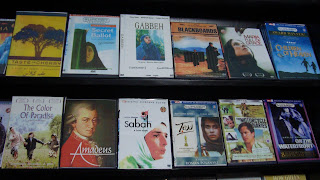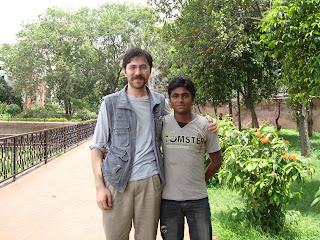Wednesday, 24 June 2009
Irane Gonotontro Mukti Pak
Sunday, 21 June 2009
Inside the Shongshod
“Happiness is a butterfly, which when pursued, is always just beyond your grasp, but which, if you will sit down quietly, may alight upon you”
I sat there, looking at the foreign minister, dressed in her gray sari across the room, surrounded by Awami stalwarts in their penguin uniforms. My thoughts drifted to a fantasy, of stopping her in the hall, of telling her to tell to the PM not to recognize the results of the Iranian election, to stand against the violence and barbarism that the government is inflicting on our people. Our government has barred its teeth against us, the people it was charged to represent. Our soldiers have fired on us, they have aimed their guns and honor at the people they had sworn to protect. And now images of Neda, her desperate family trying in vain to save her life, are stuck in my mind forever.
I am determined to play whatever part I can here in Dhaka. It is so important for people here to know and show support for students who are being persecuted in Iran. Demonstrations in Western capitals will never have the impact that a show of support will here. I hope I can get through to people in Bangladesh that fighting American imperialism is no excuse for the kind of barbarism the government has unleashed on us. I hope I can communicate to my fellow students here that we are all in this together, that nothing, nothing can justify the killing of students, the raiding of their dorms. Tehran is Tienanmen, it is Gaza, it is so much more than a disputed election. The government is now creating the future sites for a thousand Shohid Minars. Their fight and yours has always been the same. See that, and speak out, now, while it still matters. Stand with my people, and let the world know we are not alone.
If you are in Bangladesh, read, sign, and forward this statement: http://www.petitiononline.com/deshiran/petition.html
Sunday, 14 June 2009
1979 - 2009
Friday, 12 June 2009
The sabzi is more Persian on the other side...

I count seven Iranian films in this one picture. Iranian films, ones I have never heard of, are available everywhere in Bangladesh. This past winter in Iran, I searched in vain to find Iranian art films by Kiarostami, Makhmalbaaf and others in Tehran's movie stores. I found a great deal that was pirated and Hollywood, and an increasing number of Hindi movies. But it was impossible, literally impossible to find our Iranian films anywhere in Tehran. I bought a copy of "Secret Ballot", an Iranian comedie about our ridiculous elections and burgeoning democracy, and Matir Moina (The Clay Bird), a film about the social fissures that gave birth to modern Bangladesh.

I never, not in my wildest dreams, imagined that the first time I would vote in an Iranian election, I would be doing it in Dhaka. The Iranian community here is small, tight knit and eccentric to the last. One gentlemen had been here for the last 35 years, sneering at the place, railing against its every nook and cranny, but somehow so in love that he learned Urdu, Sanskrit, Hindi, and (as he claimed and I refused to believe) became the first Iranian to learn to read Bengali, which he again claimed no Bengali could write without making numerous spelling mistakes at every go.

Then there was the tea magnate who had lived here for fifty years, and the petro-man and the one who imported carpets and handicrafts to Bangladesh. We all sat around eating watermelons and imported kharboozeh, arguing intensely over whether khiaar was Arabic for cucumber, or whether it was really related to ikhtiyaar and hence never originally the name of a fruit. We then proceeded to find every last word (there are about 17,000) in common between Bengali and Persian, scratching our heads over why z's became j's and s's became sh's and finally, revealing that Mumtaz Mahal was actually an Iranian from Yazd.
Thursday, 11 June 2009
Eliminate "Monga" Forever
We can set up a program on our campus to collaborate with the Freedom Foundation in Dhaka to raise awareness about and get people all over the US and Canada involved in coming up with a way to set up a sustainable rice bank system that can be financed (so it doesn't have to rely on outside funds). I am working on a grant proposal to study the rice bank system next summer, and I'll try to learn as much as I can about the process in the coming weeks.
The people solving these problems in Bangladesh are not super heroes, they are not even geniuses. They are exactly like us, no more or less capable than we are. They have just realized how much they can do while the rest us are only just opening our eyes to all this. I visited the FF headquarters today and spoke to Safi Khan, head of the organization. He is an amazing, dynamic and highly motivated Bangladeshi American who is really committed to what he is doing.
Wednesday, 10 June 2009
Rickshawalla...

CNG’s and rickshaws are out. Cost had started adding up, especially paying as I was, the shaddha chamra, the firengi price. I asked a student-looking young man for directions, for college students everywhere are part of a single international brotherhood of the young and hopeful. “You are a guest in my country, if I do not help you then I am shy to saying I am Bangladeshi,” said Mashfique, my new best friend. And so we walked for the better part of a kilometer to a ticket stand where burly men sitting behind wooden boxes shouted like it was some kind of high end auction. I hopped unceremoniously onto the accelerating footboard, for buses never stop moving in this place. I landed with a thump into a bus full of amused expressions, regained my balance, and starred out the window at the shanty towns, the sweeper women and rickshallaw traffic jams we passed by...
Jao, rickshawalla,
Stop rickshawalla,
Aste aste rickshawalla,
Dore dore rickshawalla,
You ferry my princely self around town for pennies on the dollar,
I’ll sit here and play Rudyard Kipling.
Bame, dane, eidike, oidike, ei pasha, oi pasha,
Jao rickshawalla, jao!
I only see your face when it’s time to pay,
Sometimes not even then
And then we’ll haggle over a few dimes, because haggling is chic,
Onek door, rickshawalla? The sun is making me tired,
And I left my chati home,
Because where I come from, chatis are for rainy days
And sunscreen is for sunny days, and deodorant is for sweaty days
And AC for hot days, and bottled water for
Those unpleasant thirsty seconds between when we are full
Tuesday, 9 June 2009
Laal Baaq Friends
 The Laal Baaq Fort is an island of serenity in a turbulent sea of rickhsaws, smoke, vendors and bustling humanity of old
The Laal Baaq Fort is an island of serenity in a turbulent sea of rickhsaws, smoke, vendors and bustling humanity of old What followed was a Bengali conversation that took the better part of an hour. I proceeded to do a thing I have been dreaming of doing for a long time. I explained two verses of my favorite poem by Rumi, while speaking Bengali, in a Mughal fort, in the middle of

I walked on after the kind of farewell you hand people you have known for a long time. A group of little school girls, dressed in bright pink shalwar kameez, ran up to me, laughing, pointing, shouting “kamon achen?!”. “Bhalo!”, I replied as their faces lit up in astonishment as I threw in an “As’salamu alaykum” for good measure. They ran off, laughing hysterically, radiating waves of happiness, riding on the gentle breeze.

And then there was Mohsen, the young poet who wanted so badly to publish his work, but was too busy with school and kaaj and everything else to find the time. For close to another hour, we sat and talked, my mind feeling itself slowly but surely into a language no one had ever spoken to me five days ago. He turned to his best work, with tremendous pride, and again, I left his presence like I would an old friend.
Monday, 8 June 2009
First week in Dhaka

The rickshaw traffic here in Dhaka is incredible. The other day, my rickshaw fell over and spilled me into the street. Rickshawallas have a tough job, pedaling day and night, rain or shine. I can haggle with anyone and everyone, but never with a rickshawalla. Every rickshaw is the unique creation of its owner, and designs are highly individuated. 600,000 rickhsaws means this place is crowded, but the air is cleaner than I expected. I see trash in the streets, but the absence of plastic bags is notable. Almost all the waste here is biodegradable.
 The Jatiyo Sangshad (National Assembly Building) designed by American architect Louis Kahn. Seeing the building in person is incredible. The lush, green paddies that surround this place, the serene concrete facades, the crisp geometric cutouts, all work to create a deeply moving aesthetic. On the other side of the street lies the Zia memorial park. The place is full in the mornings with karatekas, cricket matches, strolling families and young students craming quizzing eachother before exams. A peaceful, place, and full of life.
The Jatiyo Sangshad (National Assembly Building) designed by American architect Louis Kahn. Seeing the building in person is incredible. The lush, green paddies that surround this place, the serene concrete facades, the crisp geometric cutouts, all work to create a deeply moving aesthetic. On the other side of the street lies the Zia memorial park. The place is full in the mornings with karatekas, cricket matches, strolling families and young students craming quizzing eachother before exams. A peaceful, place, and full of life.